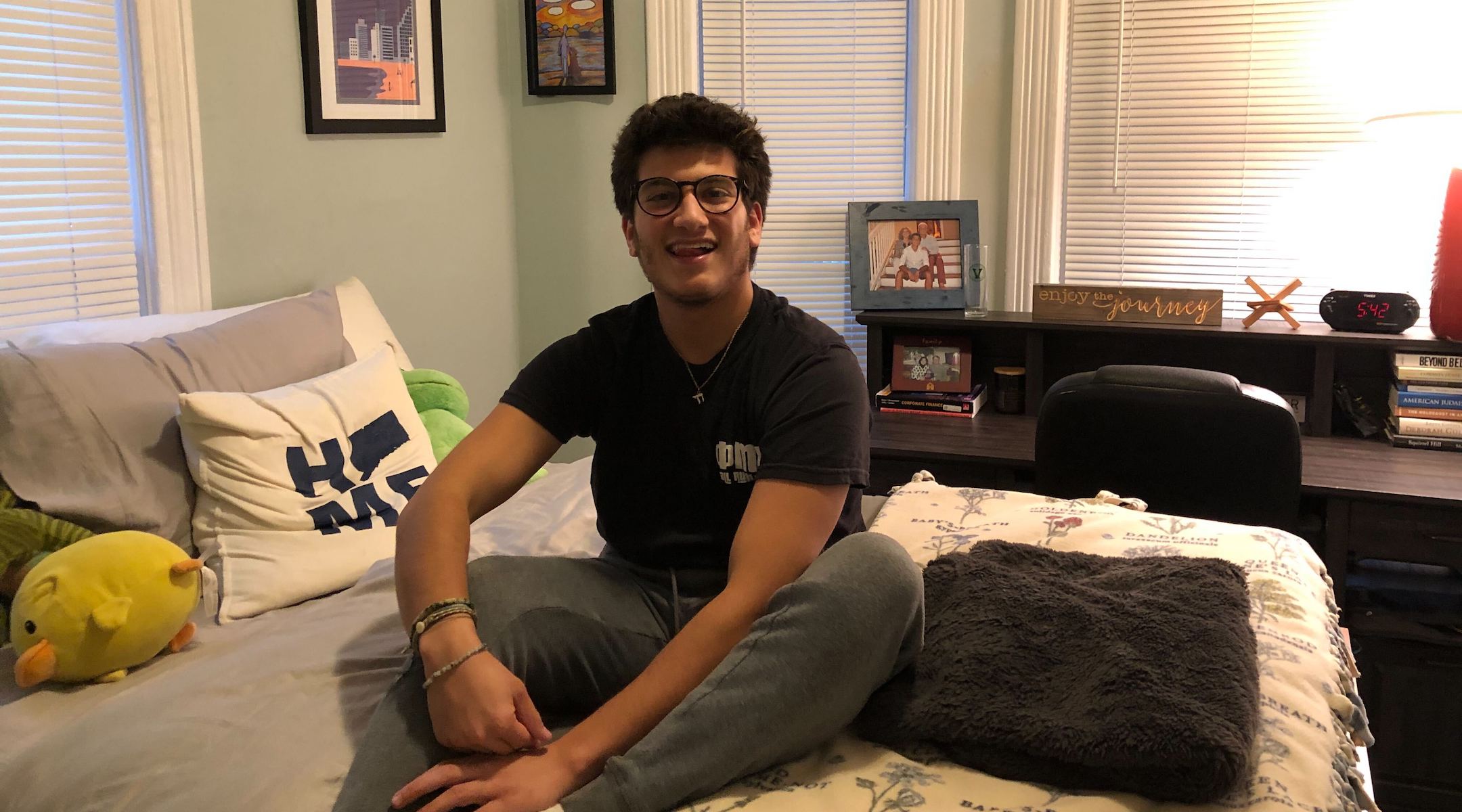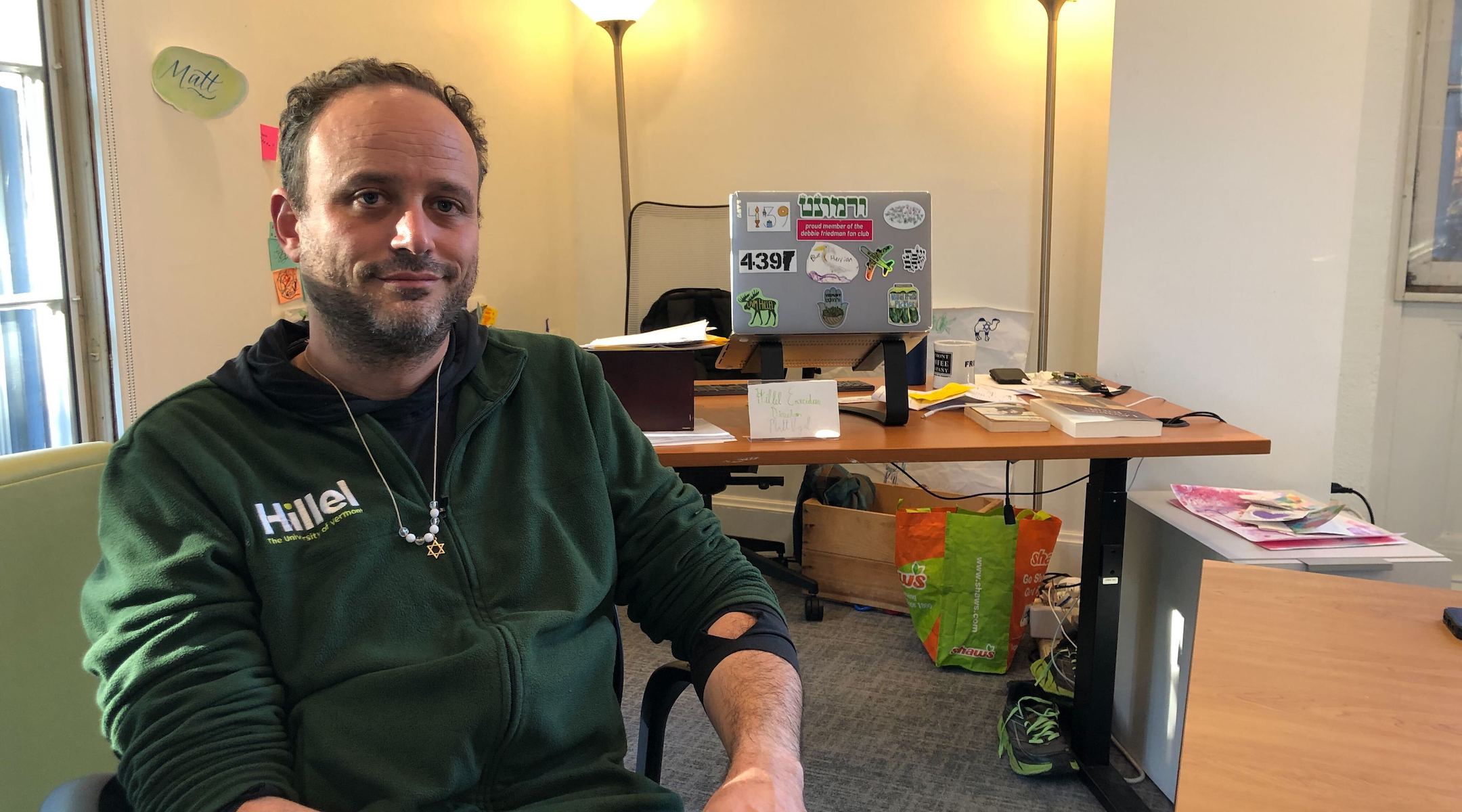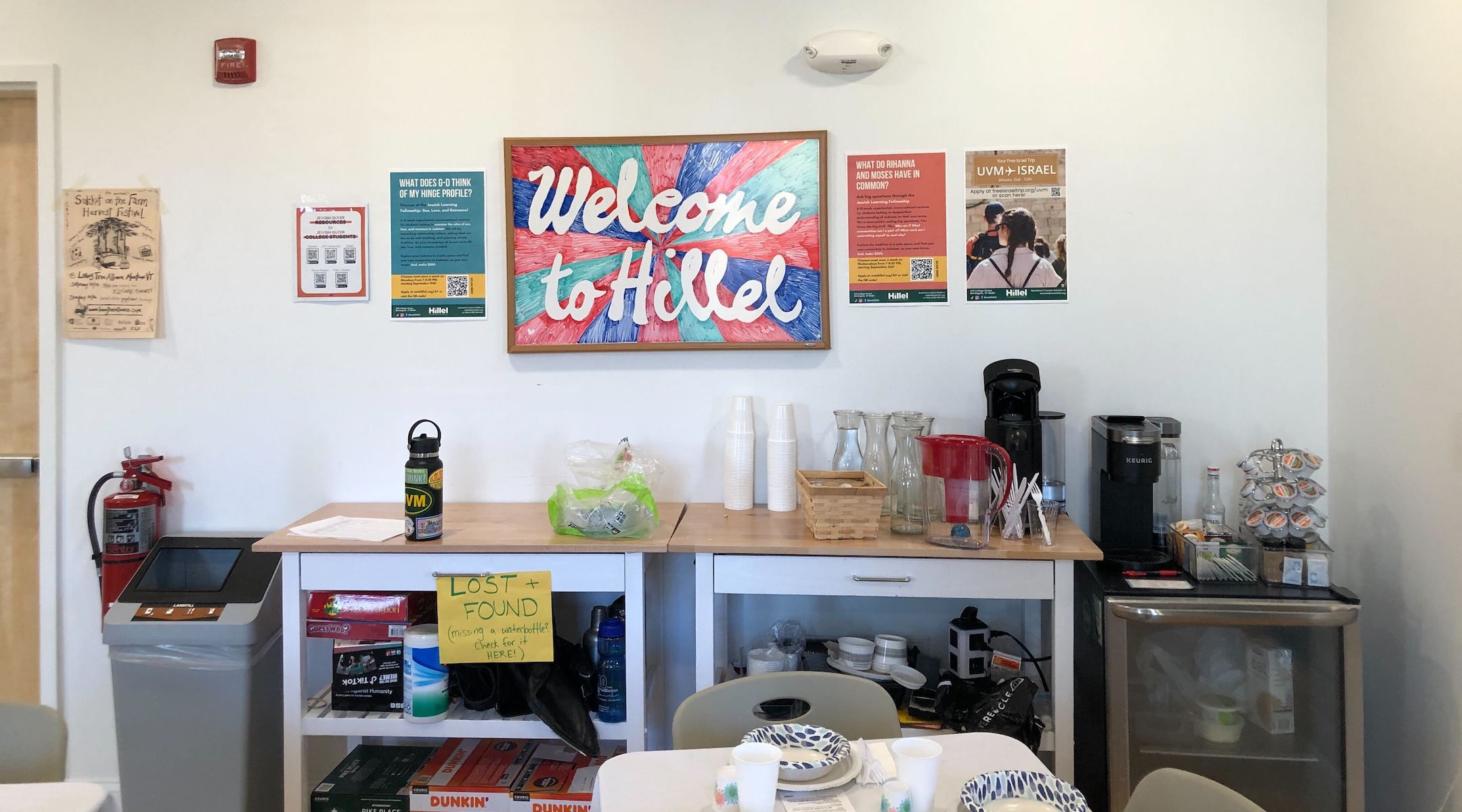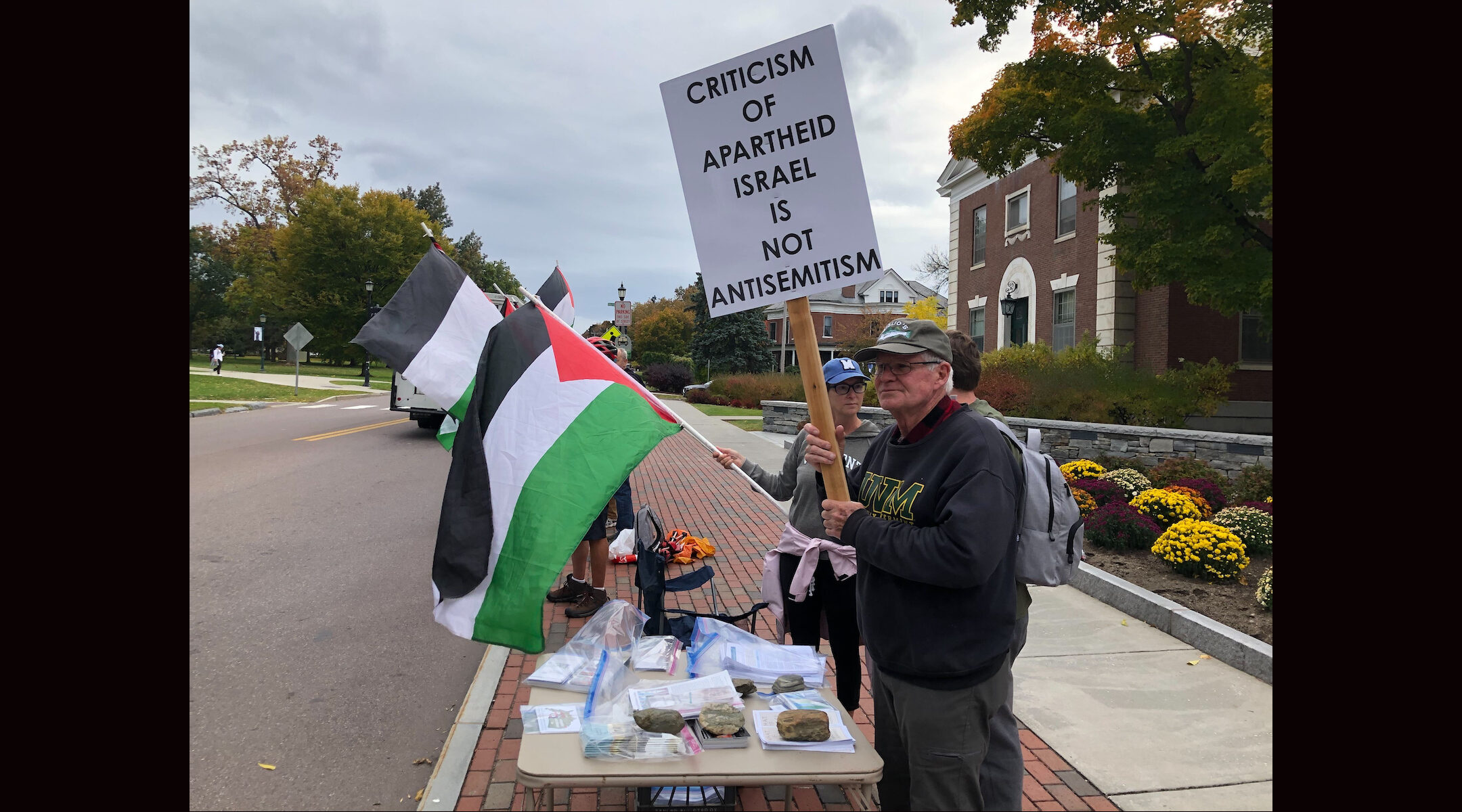(JTA) – A year of strained relations between the University of Vermont and its Jewish community has led to the school resolving a federal antisemitism complaint and pledging to do more to protect its Jewish students — including from anti-Zionist rhetoric.
The university and the U.S. Department of Education announced Monday that they had reached a resolution to the complaint, which the department took up last fall after it was filed by students and pro-Israel groups. The complaint alleged that the institution had not properly responded to Jewish students’ allegations of antisemitic discrimination. Investigators determined that the university “received notice, but did not investigate” several claims of antisemitic behavior on campus, and that the steps it ultimately took did not adequately address students’ concerns.
Notably, the department’s office of civil rights determined that one of the ways the university’s Jewish students had been discriminated against was through “national origin harassment on the basis of shared ancestry,” reflecting a controversial argument promoted by pro-Israel groups that anti-Zionist rhetoric is harmful to all Jews because the Jewish people share Israel as an ancestral homeland. The resolution of the complaint also reflects a sharp change in course for the school, which had initially denied wrongdoing and blamed the accusations on an orchestrated external campaign — a response that upset the campus Jewish community.
“This complaint was overwhelmingly dealing with the antisemitism that masks as anti-Zionism, and what the resolution demonstrates is how seriously [the office] is taking that kind of antisemitism,” Alyza Lewin, president of the Brandeis Center for Human Rights Under Law, told the Jewish Telegraphic Agency after the ruling. A pro-Israel legal group that often involves itself in campus disputes, the Brandeis Center was one of the organizations that filed the initial complaint on behalf of mostly anonymous students.
The Department of Education responded to a JTA request for comment by pointing to its letter of resolution with the university. Its civil rights office has fielded several challenges to anti-Zionist rhetoric since the Donald Trump administration expanded the department’s mandate around antisemitism in 2019 under Title VI of the Civil Rights Act. The office of civil rights is fast becoming a favorite tool for pro-Israel activists: It also announced this week it would open an investigation into allegations of a professor’s antisemitic behavior at George Washington University, a week after the university’s own investigation cleared the faculty member of charges brought by another pro-Israel group.
In the agreement, the University of Vermont pledged to revise its policies for reporting discrimination and to train its staff on how to specifically respond to discrimination complaints. The Department of Education will also review the university’s records regarding its response to last year’s allegations of antisemitism. One of the areas in which the university said it would train staff is on how to recognize “the Title VI prohibition against harassment based on national origin, including shared ancestry.”
Among the allegations: cases of unofficial student groups denying admission to “Zionist” students (including a support group for sexual-assault survivors); one graduate teaching assistant who had mused on social media about lowering the grades of Zionist students; and a group of students who’d reportedly thrown an object at the campus Hillel building (the complaint claimed it was a rock; Hillel staff told JTA it was a puffball mushroom). More than 20% of the university’s student body is Jewish, according to Hillel International.

Evan Siegel, a Jewish junior at the University of Vermont, poses in his off-campus housing in Burlington, October 13, 2022. Siegel was initially critical of his school for its handling of a federal antisemitism investigation, but praised its eventual resolution. (Andrew Lapin/Jewish Telegraphic Agency)
The agreement marked a sharp change from how the university first responded when the government announced its intent to investigate the complaint last fall. Back then, the university’s president, Suresh Garimella, issued a combative statement in which he said the university “vigorously denies the false allegation of an insufficient response to complaints of threats and discrimination.” He also issued a point-by-point refutation of the allegations in the complaint.
Garimella further charged that the complaint had been orchestrated by “an anonymous third party” that had “painted our community in a patently false light.” In addition to the Brandeis Center, the complaint was filed on behalf of students by the watchdog group Jewish On Campus, whose antisemitism-tracking methodology has been criticized by other groups.
Garimella’s combativeness at the time was an unusual move for the leader of a university accused of violating Title VI law, which prohibits discriminatory behavior at federally-funded programs or institutions, such as public universities. Groups like the Brandeis Center have increasingly leaned on Title VI in federal complaints to argue that pro-Israel students face discrimination. Title VI cases have become a central component of litigating multiple kinds of Israel discourse on campus, ranging from a pro-Israel student body president being targeted at the University of Southern California to a resolution passed by pro-Palestinian law student groups at the University of California, Berkeley.
In Burlington, where the university is located, some liberal Jews were initially dubious of the complaint. Felicia Kornbluh, a history professor on campus who often teaches American Jewish history, told JTA she was concerned about “playing into the narrative” of a conservative, pro-Israel agenda set by the Brandeis Center, whom she described as “allies of the Trump wing of the Republican party.” (The center’s founder, Kenneth Marcus, served as assistant secretary of education for civil rights under Trump.)
But the complaint also landed in the aftermath of a contentious Burlington city council meeting at which, Kornbluh and others said, pro-Palestinian protesters became hostile to Jews. The meeting featured a council resolution to endorse the Boycott, Divestment, Sanctions campaign against Israel, and resulted in a raucous scene where pro-Palestinian groups shouted down Jewish students singing prayers for peace. Kornbluh described the atmosphere there as “really scary,” and “a little like Nuremberg.” Vermonters for Justice in Palestine, a local activist group, held multiple rallies on campus in support of the administration after the antisemitism complaint was publicized.
Against this backdrop, Garimella’s dismissiveness left the university’s Jewish community frustrated and angry. During a Jewish Telegraphic Agency visit to Burlington after the president’s initial statement, Jewish students and faculty said they felt like university administration was not taking their concerns seriously.
“I feel like we’re not being supported here,” Evan Siegel, a Jewish junior who is involved with student government, told JTA while sitting in off-campus housing adorned with Jewish summer camp memorabilia. “And that sucks.”
Employed as a campus tour guide, Siegel wondered, “How am I supposed to give tours and be like, ‘UVM is the best,’ when my president is being an ass?”
Other Jewish students told JTA at the time they had no intention of supporting the university financially or otherwise after they graduated, and wouldn’t advertise the fact that they were alums.
Matt Vogel, executive director of Hillel at the University of Vermont, where one of the alleged antisemitic incidents had taken place, also reluctantly played a role in the drama of the last year, after hoping he would be able to keep his focus on Hillel’s student programming. As the fall semester was starting, he sent an email home to parents reading, “Antisemitism keeps me awake at night.” Throughout the semester, Hillel also became more active in calling out antisemitism on social media.
“Just by default, we’re at the center of it,” Vogel told JTA last fall in the Hillel building, as student volunteers chopped vegetables for that evening’s Shabbat dinner in the next room. “I’ve overheard a student saying, like, a Hillel sticker on their water bottle might turn into a political conversation about Zionism in the first two seconds.”

Matt Vogel, executive director of Hillel at the University of Vermont, prepares for Shabbat in his Burlington office, October 14, 2022. Vogel praised the university for ultimately resolving its federal antisemitism complaint in April 2023 after months of tension. (Andrew Lapin/Jewish Telegraphic Agency)
Soon, Kornbluh decided that the administration’s response to the allegations was unacceptable, and penned a local op-ed opposing it that was later shared by her faculty union in a show of solidarity.
“I was stunned by the tone and content” of Garimella’s letter, Kornbluh wrote in the piece. Accusing the university of “gaslighting,” she added, “I do know that one persistent rhetorical strategy of antisemites in Europe and the United States has been to say that there is no antisemitism.”
Garimella reversed course following weeks of criticism, a strongly worded letter from more than a dozen Jewish groups including the Anti-Defamation League and the American Jewish Committee and news of several high-profile antisemitic incidents nationally. In October, the university published a website intended to support Jewish students — accompanied by a new statement from Garimella, who now condemned antisemitism unequivocally.
“I have listened to members of our campus community who experience a sense of risk in fully expressing their Jewish identity,” he wrote. ”I want my message to be clear to the entire campus community: antisemitism, in any form, will not be tolerated at UVM.”
This time, Garimella pledged not only to investigate individual reports of antisemitism, but also to work to change the campus community’s approach to the issue. He committed to further anti-bias training and building a streamlined bias reporting system for students, and said the university’s diversity office would work to build and maintain “meaningful actions that ensure our Jewish students and community members feel support and care.”
After Monday’s resolution, Garimella was fully supportive of the findings of the Department of Education’s investigation.
“The resolution reflects an important step in UVM’s engagement with our students, faculty, staff, alumni, and the surrounding community,” he wrote in a message to the campus. “It also reflects numerous conversations we have had with our campus Jewish community and important local and national voices on the consequential and complex issue of antisemitism.”
In response to a JTA request for comment, a university spokesperson sent copies of the letters from the president and provost. (Throughout the year, the president’s office had declined multiple JTA interview requests.)
Jewish groups, including the university Hillel, celebrated the resolution. “The President and senior leadership’s new statements today represent tangible and accountable steps forward,” Vogel told JTA in a statement. “We hope this ensures that no Jewish student or any student at UVM experiences discrimination or harassment because of their identity.”

The Hillel building at the University of Vermont in Burlington, October 14, 2022. Hillel found itself at the center of a federal antisemitism complaint against the university. (Andrew Lapin/Jewish Telegraphic Agency)
Also celebrating the ruling was Jewish on Campus, a subsidiary of the World Jewish Congress and one of the groups that brought the initial complaint. “Today’s announcement is a victory for the safety and security of Jewish students,” Julia Jassey, the group’s CEO and a University of Chicago undergraduate, said in a statement.
Avi Zatz, the only University of Vermont student on the initial complaint who has made their identity public, is himself an employee of Jewish on Campus. Citing antisemitism in Vermont, Zatz recently transferred to the University of Florida — in a state that may soon pass legislation that, critics say, could harm Jewish studies on all its public campuses.
“I can’t have hoped for a better resolution,” Zatz, a junior, told JTA from his new school in Gainesville, Florida. While he said he was still glad to have left Vermont, he added, “I finally feel a sense of closure.”
Kornbluh, for her part, said the resolution was “a start,” but criticized the university for not voicing a stronger commitment to Jewish studies or meeting with Jewish faculty.
Reached by phone from Madrid, where he is studying abroad this semester, Siegel said he was “proud, determined, ready for more” following the university’s agreement.
“This resolution was really, in a respectful way, a slap in the face to the university to do better,” he said. “I, for one, am ready to get back on campus and continue my work as hard as I can.”
JTA has documented Jewish history in real-time for over a century. Keep our journalism strong by joining us in supporting independent, award-winning reporting.






